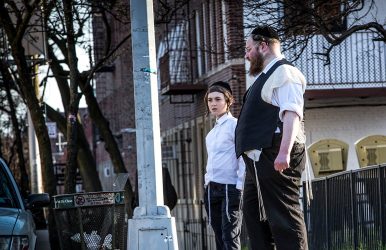As one of the only films to be performed in Yiddish in nearly 70 years, Menashe provides an insightful window into New York’s ultra-orthodox Hasidic Jewish community, and one man’s attempt to maintain a relationship with his son after the untimely death of his wife.
Menashe is a middle-aged, somewhat hapless grocery-store clerk, suffering from the recent loss of his wife after a long-running sickness. Alongside the grief, he is still attempting to make ends meet whilst dealing with being separated from his son, Rieven, as Jewish tradition dictates that Menashe is not allowed to raise him alone. Adopted by his strict uncle (who openly criticises his newly widowed brother-in-law), Rieven and Menashe’s father-son bond is further strained as Menashe seems to bungle every opportunity around him. As an act of kindness, Menashe’s rabbi allows him one week with his son in the lead up to his wife’s memorial, giving him the opportunity to prove himself as a good father and true man of his faith.
Director, Joshua Z Weinstein, steers Menashe far away from almost any Hollywood stereotype. His extensive history in documentary making is evident, with Menashe feeling very much like a fly-on-the-wall look into this private religious community. Interestingly, part of this choice of camera technique is probably attributed to the fact that the entire film was shot in secret within the Hasidic community of Borough Park, Brooklyn, which is the setting of the film.
From match-maker (blind date) set ups for freshly widowed individuals to find a new husband or wife as soon as possible, to the everyday cleansing routines of Hasidic Jews, the camera follows Menashe as he attempts to make his way through this rigidly religious world, while at some points seeming disillusioned and drifting from his faith. Weinstein also uses little-to-no music in the film, allowing the uncontrived realism of the acting speak for itself, alongside the use of natural lighting and realistic sets, all of which reinforce Weinstein’s documentary-like approach.
The main character of Menashe is played beautifully by non-professional actor and real-life grocery worker, Menashe Lustig, providing a natural authenticity to his performance with much of the film actually based largely on his real life. Lustig’s wife had died suddenly leaving him a single parent to his son, but, as the Torah states, that it is not good for a man to be alone, and Lustig must find a wife before he can truly parent his son. However, to this day, he still has not re-married and visits his son, who lives down the street, whenever he can. This real-life backbone to the story of Menashe provides a level of authenticity that many other films fail to capture, as, in this case, Lustig is merely tracing out sections of his personal reality on screen.
Menashe opens up a private world of religion rarely available to most audiences, and puts its many trials and tribulations on show. It is an insightful film, cleverly presented to the audience in a style that is well worth the film experience.
Menashe opens tomorrow.
Check out the official site here.






















